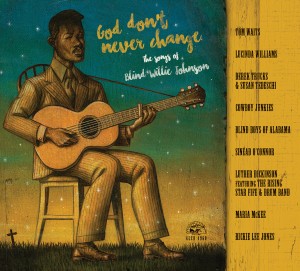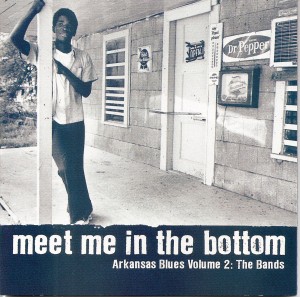 TORONZO CANNON
TORONZO CANNON
The Chicago Way
Alligator – AL 4969
Those who’ve followed Chicago-based Toronzo Cannon through the years can only marvel at how his gifts as a lyricist have blossomed. From the opening cut here, The Pain Around Me (a grim portrayal of living conditions in the ’hood), through Fine Seasoned Woman (a rare story of a bluesman saying “no” to a young temptress in favor of an older woman with “a couple of wrinkles” who knows better what life and love are about), to the pop-folkish Strength to Survive (a dispatch from a young man’s dark night of the soul, which he finally escapes by harnessing willpower and faith), Cannon’s storytelling is vivid, laced with wit and pathos, and mature—this, as they say, is “grown folks’ music,” and unabashedly so.
But fear not—the 48-year-old Cannon, whose early inspirations included Hendrix as well as both reggae and the legendary postwar Chicago bluesmen, bursts with youthful fire in his guitar work and his vocals (which have also toughened and deepened over the years). On hard chargers like Mrs. From Mississippi and Bad Contact (with its hard-funk groove propelled by drummer Melvin “Pookie Stix” Carlisle and bassist Larry Williams), he intensifies his spidery dexterity with a molten-lava tone, yet he mercifully avoids pyrotechnics; he remembers to play ideas, not just notes, even at his most unfettered. He even manages to breathe new life into erstwhile clichés like the stop-time structure of Walk It Off. Meanwhile, on a ballad like the poignant When Will You Tell Him About Me? (possibly Cannon’s finest songwriting yet), he fires down the jets yet remains both emotionally and musically focused with extended, clear-toned lines that interweave with his vocals and his sidemen’s backing.
This is a first-rate major label debut from an artist whose long-endured “well-kept secret” status should now be a thing of the past.
—David Whiteis
 JOHNNY RAWLS
JOHNNY RAWLS
Tiger in a Cage
Catfood – CFR-022
Once again, Johnny Rawls is backed by the Rays, producer Bob Trenchard’s tightly wound studio band. Their sound—equal parts deep-soul rootsy and contemporary infused with pop/jazz—complements Rawls’ own aesthetic, which has always borrowed equally from the old-school soul tradition and more mainstream pop influences. Also reflecting Rawls’ musical lineage (he worked with O.V. Wright and Little Johnny Taylor, among others), several of these songs (Every Woman Needs a Working Man, the country-tinged Reckless Heart) convey their meaning largely through aphorisms. The concluding ballad, I Would Be Nothing, is more a testimonial of need and vulnerability than a paean to erotic satisfaction or prowess. The title song portrays a doomed young man struggling to survive on the mean streets, although—unfortunately, perhaps—it stops short of any indictment of the system that facilitated his crisis.
Nine of the 12 songs here were written or co-written by Rawls. Even on up-tempo anthems—Keep It Loose (yet another Hole in the Wall spinoff); a cover of Sam Cooke’s Having a Party (on which Rawls’ gritty-sweet delivery heightens the wistfulness that Cooke hinted at in his 1962 original); Lucy (a rare Rawlsian excursion into modern, southern-soul raunch, as he encourages the lady of the title to “pop that coochie” on the dance floor)—he seems to bask in his role as storyteller as much as he relishes the material’s celebratory feel. He also takes on a few covers, including the Stones’ Beast of Burden, which may raise some eyebrows among purists. But just as Otis Redding did with Satisfaction, Rawls settles so comfortably into the song’s groove that a newcomer could be forgiven for believing it an original.
One potential quibble: fans of Rawls’ deft lead guitar work will miss it here—all fretboard chores are handled by the Rays’ Johnny McGhee. It’s clear, though, that Johnny Rawls continues to honor soul music’s living heritage in a way that both embraces that heritage and looks forward.
—David Whiteis
MAC ARNOLD & PLATE FULL O’ BLUES
Give It Away
Plantation #1 Productions – MA 31608
South Carolina’s 74-year-old Mac Arnold (featured in LB #193), and his Plate Full O’ Blues, Austin Brashier and Max Hightower, have crafted a solid selection of straight ahead blues with Give It Away. The album is comprised mostly of originals and a couple of thoughtful covers, Bobby Bland’s I’ll Take Care of You and Jerry Reed’s Amos Moses. The Bland tune is particularly haunting and successfully captures the yearning of the original while Amos Moses is an interesting choice from an idol of Arnold’s that works well in the context of this colorful set. The album’s title track is a contemplative tribute to an early, guitar-picking mentor of Hightower’s that, according to the liner notes, was made whole by some philosophical musings of Arnold. That anecdote appears to be a fitting illustration of band dynamics—the trio seems to feed off of each other’s creativity. On Give It Away they’re also joined by drummer Scotty Hawkins and Arnold’s brother, Leroy Arnold. Leroy made his brother’s first gas can guitar in 1946 and has been an influence ever since, even after his death in 2015. As a tribute to Leroy, the band is offering a free download of this album on CD Baby in April 2016.
Arnold spent most of his career playing bass. He had stints with his high school band, J Floyd & the Shamrocks (which featured a young James Brown on piano), the Muddy Waters Band, Redd Foxx (that is Arnold playing the famous bass line on the theme song for Sanford & Son) and Bill Withers before finally coming back home to South Carolina in the 1980s. He also puts on his annual Cornbread & Collard Greens Blues Festival in April and has recently opened Dr. Mac Arnold’s Blues Restaurant and Music Venue in Greenville, South Carolina.
Additional album highlights include the ramshackle ramble of road life in Train Smoke, the sweet kitchen love affair in Don’t Burn My Cornbread and the guitar-picking trip down memory lane in Uncle Dewitt’s Café. Give It Away ends with Memories, a final poignant tribute to Leroy. All in all, this is a great collection of contemporary electric and occasionally acoustic blues overseen by a true original.
—Mark Coltrain

VARIOUS ARTISTS
God Don’t Never Change: The Songs of Blind Willie Johnson
Alligator – ALCD 4968
The 29 songs that Texas gospel-blues man Blind Willie Johnson recorded for Columbia from 1927 to 1930 are the core of an enduring legacy—a legacy not solely restricted to blues aficionados. His music was one of the central subjects of director Wim Wenders’ The Soul of a Man documentary from Martin Scorsese’s The Blues PBS series. It has been featured on popular television shows like The Walking Dead and launched into outer space on Voyager Project space probes. God Don’t Never Change: The Songs of Blind Willie Johnson, produced by Jeffrey Gaskill (who also produced Gotta Serve Somebody: The Gospel Songs of Bob Dylan), features 11 of Johnson’s compositions reinterpreted by nine contemporary artists. That is a tall order, given the magnificence of Johnson’s classic performances, in terms of both his musicianship—his stunning mastery of the guitar and his inimitable growl of a singing voice—and the intense emotional resonance and spiritual power he conveys.
Rather than try to imitate Johnson, the artists chosen by Gaskill turn in spare, rootsy performances that allow them to stay true to their own artistic visions yet keep the emphasis on the genius of the originator’s compositions. If any artist today can evoke Johnson’s gravel road of a voice, it has to be Tom Waits, who is featured on two tracks, The Soul of a Man and John the Revelator. On the former, Waits is accompanied by his son, drummer Casey Waits, his wife and long-time collaborator Kathleen Brennan, who joins in a call and response, and highly effective samples of a slide guitar riff from the Library of Congress recording of Smith Casey’s Country Rag. On the latter, Waits strips things down even more as he draws upon the Son House version of the song. With his son providing a big pulse beat, Waits plucks on a cigar box banjo and wails his lead vocal amidst a swirl of multi-tracked groans. Lucinda Williams also appears on two tracks, It’s Nobody’s Fault But Mine and God Don’t Never Change. Backed by a trio that features Doug Pettibone’s slashing guitar lines in dialogue with Williams’ rhythm guitar, she moans and hums her way through two visceral performances. The Blind Boys of Alabama, supported by Jason Isbell on slide guitar, apply their brand of gospel ecstasy to Mother’s Children Have a Hard Time. Sinead O’Connor, with a group of background singers, turns in the most produced performance as she translates Trouble Will Soon Be Over into a defiant anthem. Alt-country singer Maria McKee evokes folk revival–era Odetta with Let Your Light Shine on Me. Johnson’s recorded performances were often male/female duets with one of his wives, Willie B. Harris, so his songs are right in the wheelhouse for two slide guitar driven duos that deeply mine the southern American roots music tradition: Derek Trucks / Susan Tedeschi on Keep Your Lamps Trimmed and Burning and Luther Dickinson / Shardé Thomas on Bye and Bye I’m Going to See the King. With an acoustic guitar, double-tracked vocals and lonely, plaintive horns, Rickie Lee Jones makes Dark Was the Night, Cold Was the Ground into a Salvation Army street revival. Johnson actually makes an appearance, as his sampled voice is melded into the chorus of a rousing performance of Jesus Is Coming Soon by the Cowboy Junkies, which features brother and sister, Michael and Margo Timmins. Hopefully, God Don’t Never Change: The Songs of Blind Willie Johnson will lead new listeners to the gospel/blues master and new artists to explore his repertoire. It is certainly no substitute for the real thing, but, in the end, it does leave the listener wanting more, a good indicator of a job well done.
—Robert H. Cataliotti
 ALBERT COLLINS & THE ICEBREAKERS
ALBERT COLLINS & THE ICEBREAKERS
Live at Rockpalast
MIG – 90632
Recorded in Dortmund, Germany, in 1980, for the television series Rockpalast, Live at Rockpalast captures Albert Collins & the Icebreakers in the midst of the career revival the singer-guitarist experienced when he recorded a series of albums for the Alligator label. The iconic Texas bluesman is in top form, and he really soars with a powerful, super tight band behind him. This two-CD, one-DVD set is a welcome and valuable addition to his discography/videography.
A relative of Lightnin’ Hopkins, this Texas master of the telecaster forged an individual style that melded influences from T-Bone Walker and B.B. King, distinguished by a unique fingerpicking approach. One of the beauties of the video here is that this is pre-MTV concert footage, so the unrelenting jump-cut edits and rapid-fire switching of camera angles had not yet come into vogue. There are plenty of sustained shots of the full band and individual soloists, as well as close-ups of both the guitarist’s hands squeezing blues magic from six strings. For guitar players looking for a master class, this footage is a gold mine! One of the things that also comes through on the video, which is not apparent on the audio recordings, is how physical Collins was as a performer. He kicks his legs like a kung fu fighter as he accents searing notes or slashing chords. He literally wields his guitar like an axe, swinging it with great flair and drama, moves that are facilitated by his signature slinging of his guitar strap solely over his right shoulder. It is a real pleasure to watch this blues master interact with his band and unleash one magnificent solo after another.
The Icebreakers—tenor saxophonist A.C. Reed, guitarist Marvin Jackson, bassist Johnny B. Gayden and drummer Casey Jones—are right on the money. Of course, Reed was a veteran sideman and emerged as a leader in his own right during this time. He is an inventive soloist and his flowing riffs punctuate and accent Collins’ solos. Gayden and Jones lay down a heavy funk groove, and Jackson’s rhythm work and fills provide a perfect counterpoint to Collins’ dramatic statements. Collins is a soulful singer, but clearly his guitar playing is center stage. The program, which is the same on the DVD as on the two CDs, mixes covers and originals. The former include: saxophonist Eddie Harris’ funky Listen Here; the Jessie Mae Robinson–penned, T-Bone Walker hit Cold Cold Feeling; Guitar Slim’s The Things I Used to Do; the Homer Banks / Raymond Jackson penned, Albert King classic Angel of Mercy; and two R&B gems, Johnny Morisette’s Brick and Little Johnny Taylor’s If You Love Me Like You Say. The originals from Collins include extended jams on his classics, including I Got a Mind to Travel, Frosty, Cold Cuts and Ice Pick. Live At Rockpalast testifies to the tremendous originality and power that Albert Collins brought to the blues. Longtime fans will welcome it with open arms, and newcomers should brace themselves for a knockout punch!
—Robert H. Cataliotti
 VARIOUS ARTISTS
VARIOUS ARTISTS
Meet Me In the Bottom
Stackhouse – SARC-1916
In 1976 the University of Arkansas–Pine Bluff sponsored Louis Guida’s documentation of the current state of Arkansas blues. The first batch of recordings from Guida’s project was released in 1983 on the Rooster Blues LP Keep It to Yourself, which bore the self-explanatory subtitle Arkansas Blues: The Solo Performers and was re-released on an expanded CD by the successor Stackhouse imprint in 2004. Now, at long last, Stackhouse has brought out the promised sequel, logically subtitled Arkansas Blues Volume 2: The Bands.
The 15-track disc is opened and closed by Queen Bee and the Soul Seekers, a family band from Prattsville comprised of sisters Essie (guitar), Mary (bass) and Merrill (drums), with Essie (who has more recently recorded as Essie Neal) taking the vocal on the Chuck Berry–styled Shake Your Butt and dad Richard joining in on harmonica and vocals on Jump. In between we get three tracks each from singer-guitarist Duke Bradley, who covers Albert King, Larry Davis and Willie Cobbs at the Jungle Hut in Pine Bluff; Osceola’s Sounds of Soul, with drummer James Seals singing songs from the playbooks of Howlin’ Wolf, Albert King and B.B. King; and the Texarkana Five. The latter has bassist John Walton offering a lightly swinging Meet Me In the Bottom, guitarist Nelson Carson (who had recorded for Sittin’ In With and Jade in 1950) featured on the instrumental Texarkana Hop and Travis Blaylock, who cut a handful of singles and a Blue Time LP as Harmonica Slim while living in Los Angeles in the ’60s, reprising his own You Better Believe It. The set is rounded out with two performances each by the Cummins Prison Band with vocalists Louis L. Mosley and Willie Slater, and Calvin Leavy, who immortalized Cummins Prison on his 1968 Soul Beat 45 and, sadly, became resident there in 1992.
Listeners should bear in mind that these are field recordings, which capture the ambience of the artists’ homes or local clubs at the expense of studio clarity and dynamics. The performances, too, are strictly grass roots—don’t expect innovation or feats of virtuosity, just some good old down-home blues by musicians playing for their own pleasure and that of their friends and neighbors.
—Jim DeKoster
 TEDESHI TRUCKS BAND
TEDESHI TRUCKS BAND
Let Me Get By
Fantasy – FAN-33716-02
Singer-guitarist Susan Tedeshi and guitar virtuoso Derek Trucks are a match made in heaven, musically and no doubt marriage-wise. The sounds they create on the road and in the analog studio behind their Jackson, Florida, home are the most creative and emotionally uplifting being made by any roots-oriented band performing today. The complex parts played by the 12 musicians are intricately woven together without any superfluous notes, and their grooves are tightly locked yet never common. Chord changes often come in unexpected though perfect places, melodies are consistently memorable, and lyrics by the co-leaders and some of their bandmates are rife with positive messages.
“Rise up, right where they pushed you down. Don’t let nobody ever turn you ’round. Try, try to believe it. All the caring and hard work and trouble is worth the chance,” Tedeschi wails in strong, ringing alto tones on Laugh About It, in which the rhythms seamlessly shift between deliciously syncopated 7/4 and funky 4/4. Both beats have deep pockets provided by drummers J.J. Johnson and Tyler Greenwell and playfully dancing bass lines by new band member Tim Lefebvre reminiscent of Chuck Rainey and the late James Jamerson.
Tedeshi’s powerful pipes and Trucks’ searing and slashing guitar are the main focus, but most everyone else gets room to shine individually on the band’s fourth and most fully realized album. A second vocalist, background singer and songwriting collaborator Mike Mattison, steps to the forefront twice, harmonizing with Tedeschi on the two-beat Kurt Weill–meets–Jelly Roll Morton–like Right on Time and then croons all by himself on the soulful strings-enhanced Crying Over You before it segues into a raga featuring flute, two harmoniums and Trucks’ guitar. The three-man horn section often creates New Orleans brass band textures when trumpeter Maurice Brown and trombonist Saunders Sermons use mutes while blending with Kebbi Williams’ tenor saxophone, and the background singers have all the sweetness of a downhome Baptist choir.
Early Sly & the Family Stone comes to mind as an influence, yet the Tedeshi Trucks Band’s glorious music is far more eclectic and much more orchestral and blues-oriented.
—Lee Hildebrand
MITCH WOODS
Gumbo Blues
Club 88 Records – 8808
Northern California singer-pianist Mitch Woods returned to the Crescent City, the scene of his 2005 masterpiece, Big Easy Boogie, for the equally satisfying Gumbo Blues. Whereas the predecessor was made up entirely of Woods originals written in the old-school Dave Bartholomew–Antoine Domino manner, the tunes on the disc are all associated with the late New Orleans singer-guitarist Smiley Lewis, most of them penned by Bartholomew. The great Fats Domino tenor man Herb Hardesty is back on hand, joined in the sax section by Allen Toussaint sideman Amadee Castenell and Brian Cayolle. Earl Palmer, whose wonderfully syncopated drumming helped spark the previous recording, has since died, but Bonerama drummer Eric Bolivar keeps things driving along quite nicely with his shuffle and triplet grooves. Dr. John guitarist John Fohl and Jon Cleary bassist Cornell Williams round out the band.
Woods’ muscular baritone voice and pumping, two-fisted piano are ideally suited to the Lewis classics Blue Monday (written by Bartholomew and Domino, but first recorded by Lewis) and I Hear You Knockin’. He doesn’t do such other Lewis hits as The Bells Are Ringing, One Night and Please Listen to Me, but he does delve into such lesser-known numbers as Caldonia’s Party, Big Mamou, Oh La La, Shame, Shame, Shame, Lil’ Liza Jane and the title track. The blues Too Many Drivers, cut by Lewis in 1954 with composer’s credit going to Bartholomew, is essentially the same song that Lowell Fulson waxed three years earlier as Let Me Ride in Your Automobile (and again years later under the same title Lewis had used).
While most current artists who do New Orleans music focus on either Meters-style funk or modern brass-band sounds, Wood is one of the very few who take it back to the 1950s. Through the power of his vocal and keyboard delivery and his employment of world-class musicians from the city itself, he succeeds brilliantly in keeping the tradition burning brightly.
—Lee Hildebrand
MATTEO SANSONETTO BLUES REVUE
My Life Began to Change
Wind Chill Records – WC 1002
Guitarist and singer-songwriter Matteo Sansonetto is known for his contemporary take on classic Chicago blues styles. On his latest release, My Life Began to Change, the Italian native has incorporated soul influences into his sonic palette, aided by a stellar roster of guest and backing artists.
Sansonetto’s reedy, conversational tenor gives these recordings an intimate feel, and his soloing is deliberate and assured. A devotee of Johnny “Guitar” Watson, he pays homage to the late guitar great via faithful covers of A Real Mother for Ya and I Want to Ta-Ta You Baby. Saxophonist Bill Overton and trumpeter Art Davis scatter Crescent City spice throughout the Allen Toussaint–penned Get Out of My Life, Woman. Roosevelt Purifoy’s keyboards inject deep funk rhythms into Little Milton’s That’s What Love Will Make You Do and spread soulful luster over Latimore’s Let’s Straighten It Out; on the latter, Sansonetto shares vocal duties with the ardent, bright-toned Jen Williams. Breezy Rodio contributes laid-back fretwork to a gently grooving version of Albert King’s You Sure Drive a Hard Bargain.
Four Sansonetto originals round out the tracklist. Lurrie Bell’s grizzled vocals and stinging guitar on I Was Wrong are an album highlight. The title track simmers with passionate urgency, kissed by Chris Foreman’s whimsical Hammond organ. I’ve Been Looking for You is a lively roadhouse shuffle, while a leisurely, sensual mood permeates the amorous Come On in My House.
With fine performances from all involved, the Matteo Sansonetto Blues Revue’s My Life Began to Change is a satisfying set of modern blues and soul.
—Melanie Young
BLOWFLY
77 Rusty Trombones
Saustex Records – SEX1601
Prior to release in 1970 of Los Angeles blues singer-turned-comedian Rudy Ray Moore’s best-selling album Eat Out More Often, comedians had been careful to avoid using “cocksucker,” “cum” and other prohibited words that got Lenny Bruce arrested in San Francisco in 1961. Even the famously filthy Redd Foxx substituted such terms as “cork soaker” and “mother frocker” for what he really meant. Moore opened the floodgates, however, by filling his records and nightclub routines with graphic sexual situations and four-letter and other dirty words that George Carlin would soon bring to mainstream notoriety.
Miami soul singer, songwriter and producer Clarence Reid—best known for his 1969 hit Nobody for You Babe and for Betty Wright’s Girls Can’t Do What the Boys Do and Clean Up Woman—did much the same for music as Moore had done for comedy. Donning a silly mask and cape, Reid introduced a pornographic alter ego named Blowfly on the 1971 album The Weird World of Blowfly. It contained mostly parodies of hit songs to which he gave such new titles as Hole Man and Shitting on the Dock of the Bay, taking musical humor into a far nastier realm than earlier naughty frat boy R&B favorites like Doug Clark & the Hot Nuts’ Baby Let Me Bang Your Box. Some 26 more Blowfly albums would follow over the next 45 years, the latest being 77 Rusty Trombones, issued a month after his death at age 76 on January 17, 2016.
Moore and Blowfly both became heroes to the hip-hop generation and influenced the vulgarity now so prevalent in that genre. Because such language and imagery has become commonplace, songs on the new CD like If You Don’t Blow Me By Now (based on Harold Melvin & the Blue Notes’ similarly titled 1972 hit), The Big Gay Crack (its melody and funk groove borrowed from James Brown’s The Payback) and He Will Fuck You (lifted from Queen’s We Will Rock You) are far less funny or shocking than they would have been back in the day. A line in She’s Got a Weiner (sung to the tune of the Chi-Lites’ Have You Seen Her) is especially hilarious, however: “I see that chick everywhere I go; she’s even on The Jerry Springer Show.”
Despite their general bad taste, at least Blowfly and producer-drummer Tom Bowler had the good taste to use real musicians, including a couple hot, blues-inspired guitarists, instead of synthesizers and drum machines for what was to become the nasty man’s swan song.
—Lee Hildebrand



















